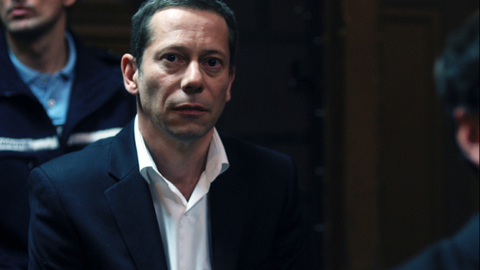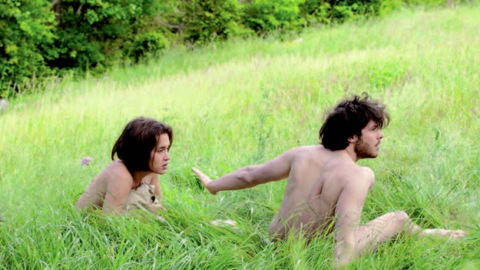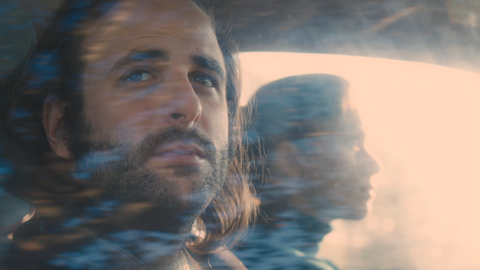Film of the Week: The Great Man
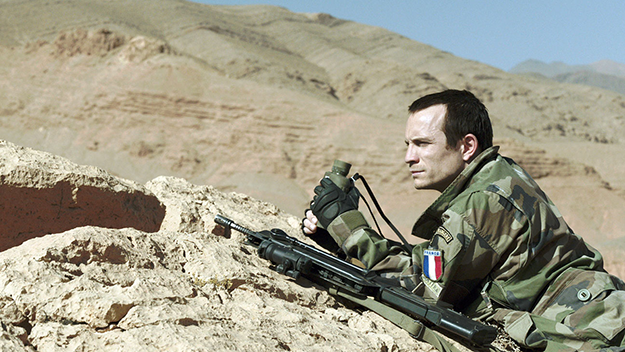
I wonder if Hollywood casting agents ever confuse Jeremy Renner and Jérémie Renier? It’s an easy mistake to make: they both have short hair, square heads, and a muscular intensity, but one is Belgian and the other American. But if anyone did accidentally call on the European actor to play a Bourne-style super-agent or to pick up a crossbow in an Avengers episode, they wouldn’t have to feel disappointed—anything Renner can do, Renier can do just as well, and with as much bulked-up masculinity. The Hawkeye guy, on the other hand, might be hard-pressed to match the versatility of his near-namesake from Brussels—you can’t imagine him slipping foppishly into tight Seventies bell-bottoms, as Renier did for François Ozon’s retro farce Potiche, or playing the narcissistic king of cheesy chansons Claude François (2012 biopic My Way).
Renier has come a long way since making his debut as the resourceful son of a slum landlord in The Promise (96), the film in which the Dardenne Brothers found their true style; he has worked intermittently with them since then, most recently himself playing a neglectful father in The Kid With a Bike (11). And in the past year, Renier has earned his spurs as a taciturn hard nut in two distinctly offbeat military roles. One is as the commanding officer of a French detachment that finds itself in deep metaphysical water in Clément Cogitore’s The Wakhan Front (Ni le ciel ni la terre), one of the less easily categorizable discoveries of this year’s Cannes—it played in Critics’ Week—and by some stretch, the most outré war film to emerge from the situation in Afghanistan.
Renier also plays a soldier in Sarah Leonor’s The Great Man, another very hard film to pin down. Because it is a film made by a woman about the French Foreign Legion, it is inevitably bound to be compared to Claire Denis’s Beau Travail, but Leonor’s feature is altogether different—much cooler, more detached, more formally precise (to the degree, arguably, of feeling a little stiff at moments), but similarly elusive in terms of exactly what it’s saying about soldiership and masculinity.
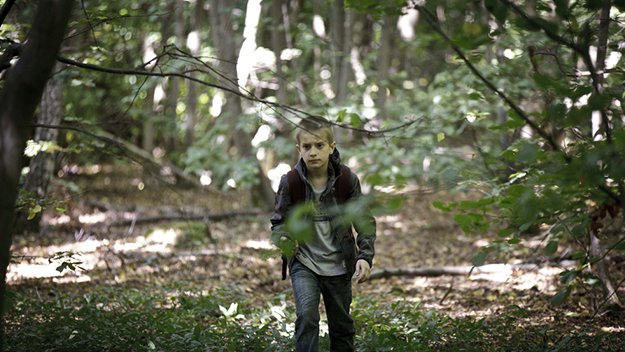
The Great Man is perhaps best described as a fable—and it starts out as one told by a child. The film is divided into five chapters, four numbered and carrying people’s names, the fifth simply called “The Great Man.” The first chapter, “Hamilton and Markov,” begins with a child’s voiceover (we can’t immediately tell if it’s a boy or a girl) narrating the story of two legionnaires carrying those names—played respectively by Renier and the compellingly saturnine Moscow-born first-timer Surho Sugaipov. Hamilton and Markov are scouts, we hear as we watch the two men in action; their job is to go behind enemy lines and discover the unmapped. As if recounting a legend, the child tells of a monster rumored to be haunting the area that the two men patrol: we see the eerie image of a leopard, its eyes lit up like jewels in the night. The soldiers start tracking the beast, and the child makes it sound as if they’ve set out into the realm of myth: “They crossed the frontier of the human world and stepped into the unknown.” But pretty soon, the realm of myth proves to be nothing more than the real world, which is just as dangerous: the pair enter enemy territory, Hamilton is shot in an ambush, Markov carries him home. Despite this heroic act, Markov is penalized at his regiment’s demob ceremony—his unspecified failings as a legionnaire have not won him the French nationalization papers he hoped for.
Now the film itself steps determinedly into the unglamorous everyday. Its second chapter is called “Mourad Massaev,” which is Markov’s real name; it is still customary for recruits to adopt new names on joining the Legion. A Chechen exile in France, he has a young son, Khadji (Ramzan Idiev), and, renting a dilapidated apartment for the two, he teaches the initially reluctant boy the Legion’s code of honor: “discipline and friendship . . . courage and honesty,” and always complete a mission. Then Mourad meets up with his old buddy Hamilton, who’s getting over his war wounds; a more hedonistic, and somewhat directionless type, Hamilton helps Mourad out by offering him his own ID papers, which will enable his friend to get a job. Henceforth, Mourad will be “Michaël Hernandez”—Hamilton’s real name and the title of the third chapter, in which Mourad suddenly vanishes. So, if the fake Michaël Hernandez disappears, what happens to the real one, who is now suddenly without his original name? Add to this that the fourth chapter is called “Massaev Khadji Mourad”—Khadji’s full name, incorporating his father’s—and you begin to see that identity and naming are key themes of the film. The play on real and assumed names recalls the novels of French Nobel laureate Patrick Modiano, whose characters often have improbable names that mark them out as figures belonging to fiction rather than primarily to the real world—with which in any case, they have somewhat precarious connections.
I won’t give away too much about the film’s subsequent chapters, except to mention that they increasingly involve Hamilton and the boy, who find their way towards each other, and that the meaning of “The Great Man” (in French, Le Grand Homme) remains mysterious throughout. But the phrase possibly suggests a sort of mythical archetype of male heroism, or perhaps comes to be a sort of collective identity, embodying the son and his two fathers, one real, the other adoptive. The Great Man is what you could call a “baton narrative,” in that the story is passed on from one character to another, chapter after chapter. It’s a technique by no means unusual in literary fiction, but rare in cinema: André Téchiné often uses it, and it’s the basis of the twists in Derek Cianfrance’s The Place Beyond the Pines, and in another of this year’s French discoveries in Cannes, Les Cowboys, by Jacques Audiard collaborator Thomas Bidegain. Both Bidegain’s and Cianfrance’s films have this in common with The Great Man: they all involve the passing on of knowledge and of some kind of mission, as well as of narrative focus, from one generation to another. By the end of Leonor’s film, it’s apparent just who was telling the story we heard at the start—which might make us want to go back and follow again the process by which brothers in arms Hamilton and Markov have passed through the real world to become a modern myth, at least in one child’s imagining.
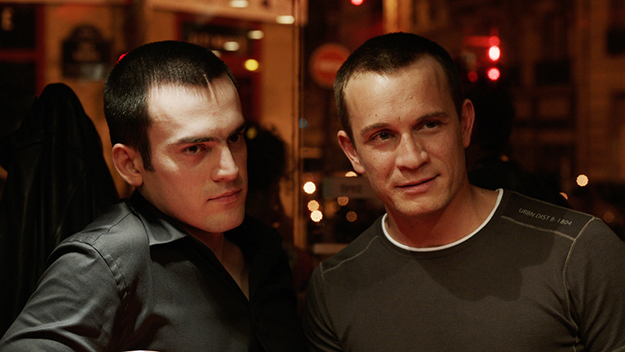
I haven’t previously come across Sarah Leonor, the film’s director and co-writer (with Emmanuelle Jacob); she previously made a feature called A Real Life (Au voleur, 09) with Guillaume Depardieu. She comes across here as a very unfussy stylist, with a rigorous concentration on her complex but stripped-down narrative and on the best way to dole out the specific information we need at any one time, and no more. This is, in the best possible way, one of those films that keep you wondering just where it’s going, and that keep you holding on, even when (especially when) it’s as if you’re feeling your way in the dark. Some reviews have compared Leonor’s style to Michael Haneke, but I see that only in the cleanness of the execution. What strikes me about the film is its absolute clarity, both narrative and visual. The storytelling achieves a very precise balance between, on one hand, socially specific realism (particularly relating to the plight of Chechen immigrants, and the situation of ex-soldiers cut adrift by the state to survive on their own resources) and on the other, occasional strong impressionistic images in Laurent Desmet’s photography (divers plunging into water, legs casting shadows on a shining city pavement).
The ending wraps the film up in an unexpectedly upbeat way, but the general sense of enigma still hovers, and its characters’ futures hang tantalizingly. It’s a curious fact of Jérémie Renier’s career that he’s gone from playing a struggling son (The Promise) to feckless young fathers (including the Dardennes’ The Child) and now plays a man maturing out of the symbolic childhood of soldiery into a fully fledged paternal adult. It’s always fascinating when child actors stay in it for the long haul, in the process becoming Everyman and Everywoman figures: in The Great Man, the strange mirror duo of competent patriarch and terrified boy shimmers fascinatingly in Renier’s unflashy but compelling performance.



